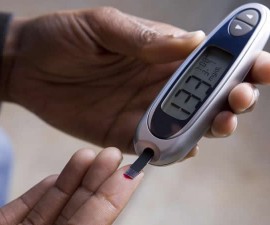Type 2 diabetes is the most common form of diabetes mellitus. Unfortunately, it still has no cure. Once you’re diagnosed with it, you will have it for the rest of your life. But although it’s chronic and incurable condition, it’s manageable. The chance to live long with it is pretty good, too!
Type-2 diabetes develops gradually
You body needs hormone called insulin to help regulate blood sugar. This hormone is made by special cells called beta cells in the pancreas (an organ behind and below stomach). It is required to help move glucose (sugar) from bloodstream into cells of the body.
Diabetes occurs when something goes awry with your insulin. There are several types of diabetes; type 1, type 2, and gestational diabetes (it only occurs in pregnancy, as the name suggests).
In type 2 diabetes, the pancreas doesn’t produce adequate insulin or the body cannot use insulin effectively (insulin resistance)! As a result, blood sugar level is more difficult to manage and easier to fluctuate abnormally.
Making the diagnosis of the disease as early as possible is important. Early diabetes is easier to manage. On the other hand advanced diabetes, especially when it has caused its complications, is more difficult to treat.
If you experience some of the following diabetes symptoms, see a doctor promptly:
- Frequent urination (you pass urine more often than usual).
- Increased thirst. See also the reasons of why diabetics can get so thirsty in this post!
- Frequent infections and difficult (slow) to heal.
- Changes in appetite, which may also be followed with weight changes especially unplanned weight loss.
Unfortunately, there is usually no early sign of the disease. People with type 2 may not have the symptoms for many years.
Type 1 diabetes is thought as a consequence of autoimmune disorder, a condition in which the body immune system attacks its own healthy cells or tissues. For this kind of diabetes, the pancreas is very poor in producing insulin. Even in some cases, it doesn’t produce insulin at all!
Both type 1 and type 2 can run in families. But type 2 is likely to be associated with lifestyle factors – in other words, it is preventable.
Obesity, especially increased waistline, is a common risk factor. In fact, people with type-2 diabetes are obese or overweight when they are diagnosed. Obesity is not only bad for your heart. Gaining more pounds of excess weight can make it harder for the body in using insulin correctly.
In less common cases, it affects thin people, too – but this is commonly found in the elderly. Yap, age is another risk factor (the risk increases with age). Lack of exercise (sedentary lifestyle) and poor diet also have an effect.
Can you live long with type-2 diabetes?
Many diabetics worry about the prognosis and their life expectancy after their diabetes diagnosis. Although death is not pleasant subject, it’s human nature to get to know about ‘how long we can expect to live’.
There are some statistics for diabetes life expectancy, but no one that can tell you exactly what will happen. Each case is unique and varies. Furthermore, there are a number of different factors that can affect this life expectancy.
But in essence, it’s important to manage type 2 diabetes otherwise some serious complications will occur which some can be life-threatening. In fact, diabetes is one of top ten causes of death in the U.S (2010) – according to the American Diabetes Association. And a report published in the Oct issue of the New England Journal of Medicine, it carries about 15 % increased risk of premature death.
Some studies suggest that the risk of death from diabetes is higher if you have the disease at young ages. The reason is not fully known. But in general, having it at a younger age will make you spend a longer period of your life living with it – this means there is a greater chance to have death due to this disease.
The good news, type-2 diabetes is manageable though it still has no cure. The chance to live long with it is pretty good, especially true if the disease has not become advanced.
Both type 1 and type 2 are serious and life-threatening. They can carry a serious impact on health. However in general, it is relatively easier to cope with type 2 – though it also takes a lot of time, care, and persistence to manage!
Nowadays, the improvement of knowledge in diabetes care is significantly helpful to improve the prognosis and outlook of the disease. Even without medicine, some diabetics are able to cope with the disease and live longer if they stay in their healthy weight, healthy-balanced diet, and become more active.
Appropriate lifestyle measures are part of the main treatment plan. Although sometimes medicine is required to help control the disease, lifestyle changes can play a key role to deal with it.
High blood sugar is the main concern in the treatment plan of diabetes. The goal of the treatment is to keep blood sugar under control. If you have diabetes, how well you control your blood sugar is the key of how long you can live.
Higher blood sugar levels can come together with high cholesterol or/and high blood pressure. The combination of these conditions can cause damage to many organs of the body such as nerves, eyes, kidneys, and heart.
Chronic high amount of glucose (sugar) in the bloodstream over a period of time will allow serious, life-threatening complications of the disease to set in, such as:
- Heart disease or other cardiovascular diseases.
- Kidney damage (kidney disease).
- Diabetic eye disease (diabetic retinopathy).
- Diabetic ketoacidosis, a condition of when the body begins running out of insulin. This can cause increased thirst, disorientation (confusion), rapid heartbeat, or even coma.
Again, it’s manageable and even many times you can manage it without medicine. If you’re diagnosed with type 2 diabetes, this is not the end of everything. There are still plenty of things you can do to improve the quality of your life, keep productive, and live longer. The following are the proven effective ways to improve your life expectancy.




